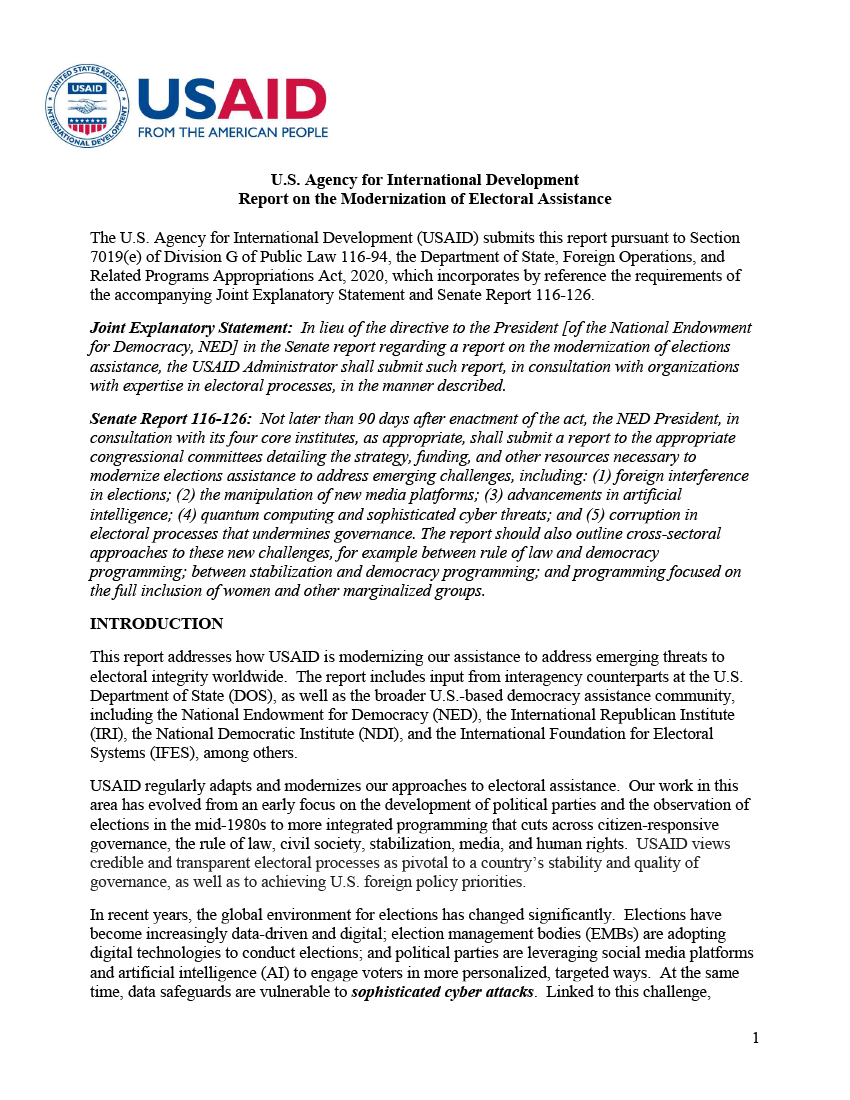Speeches Shim
The U.S. Agency for International Development (USAID) submits this report pursuant to Section 7019(e) of Division G of Public Law 116-94, the Department of State, Foreign Operations, and Related Programs Appropriations Act, 2020, which incorporates by reference the requirements of the accompanying Joint Explanatory Statement and Senate Report 116-126.
Joint Explanatory Statement: In lieu of the directive to the President [of the National Endowment for Democracy, NED] in the Senate report regarding a report on the modernization of elections assistance, the USAID Administrator shall submit such report, in consultation with organizations with expertise in electoral processes, in the manner described.
Senate Report 116-126: Not later than 90 days after enactment of the act, the NED President, in consultation with its four core institutes, as appropriate, shall submit a report to the appropriate congressional committees detailing the strategy, funding, and other resources necessary to modernize elections assistance to address emerging challenges, including: (1) foreign interference in elections; (2) the manipulation of new media platforms; (3) advancements in artificial intelligence; (4) quantum computing and sophisticated cyber threats; and (5) corruption in electoral processes that undermines governance. The report should also outline cross-sectoral approaches to these new challenges, for example between rule of law and democracy programming; between stabilization and democracy programming; and programming focused on the full inclusion of women and other marginalized groups.
INTRODUCTION
This report addresses how USAID is modernizing our assistance to address emerging threats to electoral integrity worldwide. The report includes input from interagency counterparts at the U.S. Department of State (DOS), as well as the broader U.S.-based democracy assistance community, including the National Endowment for Democracy (NED), the International Republican Institute (IRI), the National Democratic Institute (NDI), and the International Foundation for Electoral Systems (IFES), among others.
USAID regularly adapts and modernizes our approaches to electoral assistance. Our work in this area has evolved from an early focus on the development of political parties and the observation of elections in the mid-1980s to more integrated programming that cuts across citizen-responsive governance, the rule of law, civil society, stabilization, media, and human rights. USAID views credible and transparent electoral processes as pivotal to a country’s stability and quality of governance, as well as to achieving U.S. foreign policy priorities.
In recent years, the global environment for elections has changed significantly. Elections have become increasingly data-driven and digital; election management bodies (EMBs) are adopting digital technologies to conduct elections; and political parties are leveraging social media platforms and artificial intelligence (AI) to engage voters in more personalized, targeted ways. At the same time, data safeguards are vulnerable to sophisticated cyber attacks. Linked to this challenge, elections around the world face the growing threat of malign foreign interference, which is not new, but is increasing in intensity, sophistication, and scope. Foreign actors, as well as domestic provocateurs, are manipulating new media, including by launching disinformation campaigns to undermine elections and broader political processes. They are using AI increasingly to automate processes that create, amplify, and micro-target online propaganda and misinformation campaigns. Elections also face more pervasive forms of corruption that breaks the chain of accountability between voters and elected officials, thus undermining democratic governance.
While the challenges have grown more complex, USAID continues to build on several opportunities and positive developments. In many countries, USAID’s funding and technical assistance focuses on a new generation of politicians, women, and young leaders. New technologies pave the way for new entrants into the political arena, and civil society plays a key role in demanding greater transparency in financing and holding legitimate elections. USAID has worked to increase the professionalism and capacity of election-management bodies in many countries. Domestic, citizenbased, and international election observation efforts have spread globally with financial and specialized assistance from USAID and others in the U.S. Government.


Comment
Make a general inquiry or suggest an improvement.